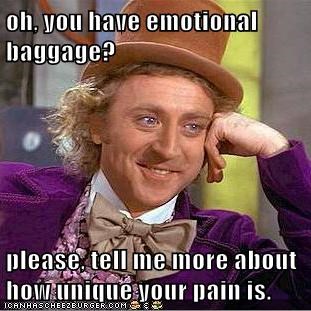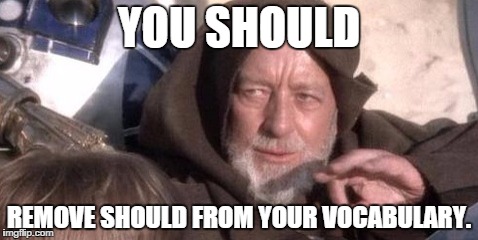Over time, I’ve learned to endure the onslaught of self-loathing and emptiness that comes with a depressive episode. I’ve learned to brace myself against the waves of fear and sadness as they batter my spirit over and over again.
I’m glad to be in calmer waters now.
And I’m learning to ride the waves, to keep my head (mostly) above water. You see, I’m not fully healed. I’m still hurting, but I’m healthier and more optimistic than I once was. I’ve found the light at the end of the tunnel, and I want to let you know that YOU HAVE IT INSIDE OF YOU TO BEAT THIS.
Happiness is worth fighting for.
Hope for a better quality of life is worth fighting for.
Dealing with depression and anxiety is no joke, but I want you to know you’re a warrior.
Posted by Chris Crocker on Thursday, January 14, 2016
*Preach*
But to get better, you’re going to need your strength. Recovering and healing from depression is an ongoing process. Depression tests the endurance of the human spirit. You learn to accept the good days and the bad. When I look back to where I was two years ago, I can see how far I’ve come.
What does a “good day” look like?
For me, a good day is being able to sit back, write and listen to music. A GREAT day is one free of worry, with no pressing deadlines or overdue library books looming over my head. Coming out of a major depression, I’m learning to enjoy life’s simple pleasures again.
It might seem like a small victory, but being able to identify a good day vs. a bad day can be a big step toward healing. Once we begin recognizing the symptoms of our mental health, we can start developing strategies to balance our emotions and thoughts.
From there, we can develop healthier habits…which eventually leads to this wonderful conclusion:
“Yay! This crappy feeling isn’t going to last forever!”
But getting to that magical moment takes a LOT of work.
For me, communication is key to managing my mental health. If I’m not talking openly with friends and family, there’s less of a chance I’ll get the help or support I need. The more I talk, the less likely I am to suppress negative emotions or obsess over things I can’t control. My friends and family keep me anchored to the most important things in life. They keep me focused on being my best self, each and every day.
Buuuuut sometimes my best self is a hot mess (and that’s okay).
In addition to panic attacks (which seriously suck), I experience depressive episodes of varying degrees. For most of my life, I didn’t understand what was “wrong” with me. I brushed my malaise aside as a shortcoming I needed to curtail. I thought it was a weakness of character, some sort of dark, self-obsessed neuroticism. I was raised to be a strong woman, so even during the darkest days I would straighten my spine and face the world head on.
“Pull yourself up by the bootstraps, wipe your tears and move the f*ck on,” I kept telling myself. Back then I thought my problems were mine to bear, no one else’s.
But that’s just not true!
What I’ve learned on this journey of healing is that pain and suffering is inherited from generation to generation. We aren’t the only ones who need to heal. Most of our family members could use a little extra love and kindness. When you boil it down to psychology and statistics, we’re all a little bit broken.
The “tough it out” method got me through the short term, but I was never generous enough with myself to find balance. I treated my wounds with scathing self-criticism and blindly pushed myself to move onward and upward, no matter what the cost to my health. When my father died, everything changed. I finally began exploring all of the pain I had been feeling for the past 20 years…but that’s a story for another time.

(Don’t listen to Snarky Wonka. He’s an asshole.)
Seriously, tho…therapy helps.
Talking to a stranger about your deepest emotional issues can be, well…uncomfortable, but therapy has helped me reach a greater level of self-awareness in respect to my illness. I’ve even learned a few “Jedi mind tricks” that have helped me overcome cognitive distortions.
NOTE: Please keep in mind that it may take time to find a therapist who makes you feel comfortable. If you have the luxury to shop around for a mental health provider, take the time to research your options, possibly meeting with more than one therapist until you find the right fit.
In addition to therapy, medication has helped me achieve a more balanced life.
Do meds make you feel like a zombie?
To be honest, I was extremely reluctant about taking medicine for my depression. I witnessed classmates abuse pharmaceuticals like Xanax during college, and I was concerned about feeling drugged or dulled down, especially at work or in the bedroom. It took a while to find the right solution, but no, I don’t feel like a zombie.
When I finally breached the topic of depression during a visit with my primary care provider (PCP) last year, our conversation went something like this.
***
ME: I’m feeling tired all of the time, and my body aches.
PCP: There’s really no reason a healthy young woman should feel that way, so we’ll take a blood sample to make sure everything is okay. Otherwise, how healthy would you say your lifestyle is?
ME: I don’t have energy to do very much, so my exercise and eating habits aren’t that great. I’ve actually been feeling stressed and depressed lately.
(After brief discussion)
PCP: Have you considered medication?
ME: (With tears in my eyes) I don’t want to rely on a pill to be happy.
PCP: Millions of people take depression medicine every day.
ME: (Tearful silence)
PCP: Here’s what I would suggest, we’ll start you on (depression meds) and schedule a follow-up in six weeks so you can tell me how the medicine is working. You can also reach out to me between now and then with any questions or needs you may have. I can also recommend a therapist. Would that work for you?
ME: Yes, that sounds good.
***
It took an enormous amount of strength to discuss my depression with a doctor, but I found just enough support among my family and friends to take that crucial first step toward treatment. Since then I’ve spoken with doctors and therapists who have given me fresh perspective on my health. (Good news! Overall, I’m pretty well-adjusted.)
But I wouldn’t have had the courage to get treatment if I hadn’t spoken up about my condition. (That’s why reaching out is so important.)
Being well-adjusted doesn’t always diminish the effects of PTSD, social anxiety or depression. Sometimes it takes a conscious effort to make it through the dark days. For me, staying strong for my family is the greatest reason to keep fighting, but I also realize my condition is medical. Removing guilt from the situation enables me to take the time I need to heal. As an introvert, this means a lot of quiet time. For any extroverts out there, it may mean spending more time with people.
Guidelines for Coping Strategies
- Don’t talk down to yourself. Avoid self-pity.
- Maintain friendships.
- Focus on what you can control.
- Go outside.
- Seek counseling.
- Do what you can, when you can.
- Keep doing the things you love.
- Work to understand your illness so you can speak confidently about it.
- Don’t overdo it. (Don’t spend too many spoons!)
- Get the rest you need.
- Find a support group.
- Allow yourself time to grieve, reflect and feel.
- Set priorities.
- Learn to adapt.
Happy healing, everyone!
Like Tough Cookies on Facebook for daily inspiration!
Blair Casey
Blair Casey is an amateur hiker, perpetual note scribbler and news junkie. She lives in Fayetteville, Arkansas, with her husband and two cats.









